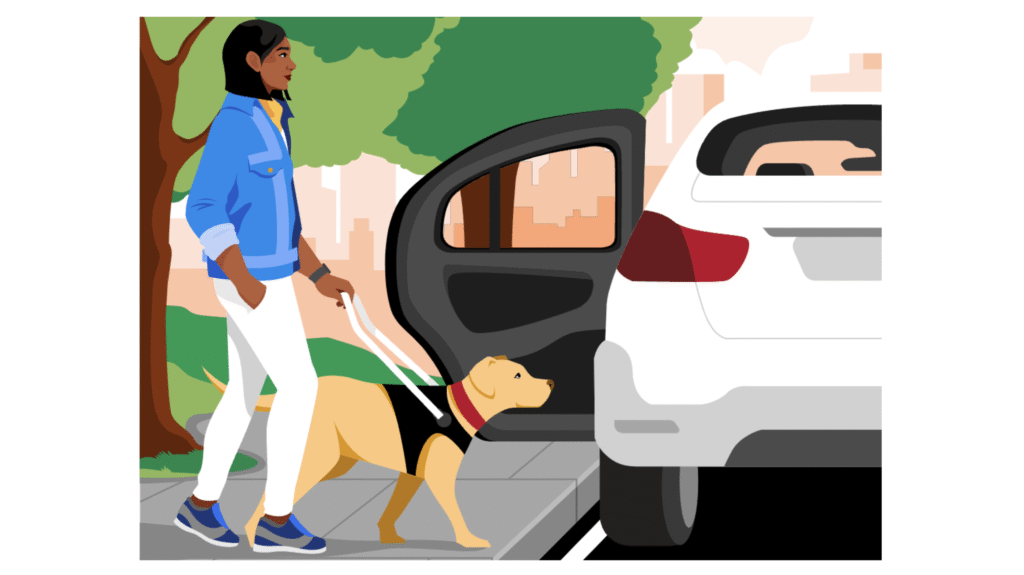At Alaska Dog Works, we know that training a service dog is only part of the mission. The bigger goal is true, everyday accessibility, for our clients, their dogs, and the places they go.
So when our lead service dog trainer, Michele Forto, flew into Juneau to deliver a service dog to a handler in Skagway, Alaska, she expected her work to be full of travel logistics, dog training, and client handoff. What she didn’t expect was a rideshare ordeal, one that underscores an important issue: many transportation systems, including Uber, still struggle with properly handling service animals.
The Uber Ride from Juneau Airport: What Went Wrong
After the flight landed, Michele requested an Uber to take her (and the service dog in training) from the Juneau airport to her hotel. The driver hesitated, questioned the legitimacy of the dog, and added delays by demanding information or clarification about the dog’s status.
That shouldn’t happen. Under both federal law and Uber’s own policy, refusing service to a rider because of a service animal is explicitly prohibited.
This kind of confrontation isn’t just irritating, it’s exactly the kind of barrier that people with disabilities, and the dogs that support them, shouldn’t have to face.
What Uber’s Official Policy Says (and Why It Matters)
Uber publishes a “Service Animal and Assistive Device Policy” for the United States, which is instructive and uncompromising. Here are the key points that matter for service dog users and trainers alike:
1. Drivers May Not Deny Service Due to a Service Animal
Uber states that “state and federal law generally prohibit transportation providers from denying service to riders because of their service animals” and that its own policy prohibits Uber drivers from refusing service for that reason. Uber
That means no exceptions, not for allergies, religious objections, or general fears of animals. Uber
2. Service Animals Are Not Pets
Uber’s policy clearly defines a service animal as “an animal that is trained to work or perform tasks for an individual with a disability,” distinguishing them from pets. Uber
3. No Proof or Documentation Required
Riders are not required to provide documentation, registration, or even have their service dog wear a vest or tag. The only permissible question a driver can ask is whether the animal is a service animal and what tasks it performs. Uber
4. No Cleaning Fees for Shedding or Hair
Uber policy states that riders with service animals cannot be charged cleaning fees for hair or shedding from their service dog. If such a fee is imposed, riders may be eligible for a refund. Uber
5. Assistive Devices Also Protected
Beyond service animals, the policy extends to assistive devices like wheelchairs, walkers, canes, crutches, and more. Drivers must not refuse service or assistance in stowing these items. Uber
6. Reporting Issues Is Encouraged
If a rider faces discrimination or improper handling, Uber’s policy encourages filing a service animal or assistive device complaint through the rider app or website. Uber maintains a specialized support team to review such complaints. Uber
This policy is strong on paper, but in practice, many drivers are either unaware of or unwilling to abide by it. That’s what Michele experienced firsthand.
Why This Matters: The Real-World Consequences
When drivers ignore or resist these rules, it’s not just legal misstep, it’s a violation of a person’s rights. For service dog handlers who rely on these animals for mobility, medical alerts, PTSD support, or other essential functions, being refused a ride can lead to:
Missed appointments
Stranding in isolated locations
Embarrassment, stress, or fear
Reinforcement of isolation from the public
In Alaska, where public transport is limited and communities are remote, rideshare services fill a critical gap. Yet that gap becomes meaningless if accessibility isn’t honored.
How Alaska Dog Works Prepares Our Teams for These Scenarios
Because we train dogs to serve in real-world settings, every placement with Alaska Dog Works includes:
Public-access and travel readiness: We practice in airports, hotels, ferries, and rideshares to desensitize dogs to common travel distractions.
Handler education: We teach clients their legal rights, how to advocate for themselves, and how to de-escalate conflicts if they arise.
Support and coaching: Even after delivery, clients can reach out to us when they face barriers or need help navigating an accessibility challenge.
When Michele finally arrived in Skagway to complete the handoff, the focus was on coaching the new handler and dog team, not navigating ride denials.
Steps Riders and Drivers Should Take (To Prevent Incidents)
For Riders/Handlers:
Know your rights under ADA and Uber’s policy (no extra fees, documentation, or proof required).
Anticipate resistance and stay calm. Politely restate your legal right.
File complaints if drivers refuse service, then follow up.
Politely offer to return the ride if driver wants to cancel, but stand firm on your rights.
For Drivers/Rideshare Providers:
Educate yourself on the distinction between pets and service animals.
Never deny service because of fear, allergies, or appearance. Uber policy forbids those excuses. Uber
Don’t charge cleaning fees for service animals.
Follow the two allowed questions only: Is it a service animal? What tasks does it perform?
Undergo training about disability rights and ADA compliance.
The Road Ahead for Accessibility in Alaska
Michele’s experience in Juneau is small in the scope of our work, but the implications are large. As rideshare services become more prevalent even in Alaska’s remote towns, enforcing accessibility is no longer optional, it’s essential.
At Alaska Dog Works, we’re committed to coaching not just dogs and handlers, but communities, transport providers, hotels, businesses, on real inclusion. This means pushing for:
Broader training and enforcement of ADA obligations
Stronger accountability for discrimination
Clear public awareness so drivers and riders alike understand their rights
Until that day, we’ll keep placing exceptional service dogs, and helping our handlers face real-world challenges with strength, confidence, and dignity.










